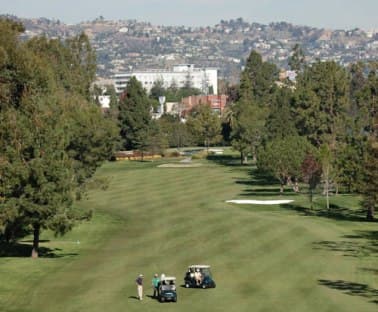Hillcrest Country Club

Hillcrest Country Club, is a Private, 18 hole golf course located in Los Angeles, California.
The Hillcrest Country Club golf course opened in 1920. It was designed by Willie Watson. William F. Bell and William P. Bell designed the back nine in the 1940s, and Robert Muir Graves redesigned six holes in 1974
The 18-hole private course is located in the heart of the city. The course has tree-lined fairways and a strict enforcement of its membership policy. Another unique feature of the course is that they have a "no cell-phone policy" providing a serene atmosphere for a peaceful game of golf. The exclusivity and the popularity of the course make it difficult to get in to play, but the scenic, hilly course is worth it.
This hilly course may not play exceptionally long, but accurate shotmaking is still at a premium. The terrain is beautiful, featuring many trees lining the fairways. The signature hole is #9, a par 4, requiring an approach shot to a sharply-sloped green which is difficult to read. Caddies are mandatory if you choose to walk the course.
More about the history of HillCrest...the Country Club
Located at 10000 Pico Boulevard across the street from Fox Studios, Hillcrest was the first Los Angeles country club for the city's Jewish community. In 1972, the Los Angeles Times referred to Hillcrest as "the leading Jewish country club in Southern California." In the 1950s, oil was discovered on Hillcrest's land, and Hillcrest allowed drilling. Members, who have shares in the club, collect tax-sheltered dividends on their original initiation fees, and "B.O." (for "before oil") memberships became so valuable that they were willed.
Early years In old Hollywood, when Jews were not permitted to join non-Jewish country clubs, they instead joined Hillcrest, all of whose members were Jewish. In An Empire of Their Own, Neal Gabler described charity dinners of the 1930s where movie moguls would gather at Hillcrest and outbid one another with gifts to the United Jewish Welfare Fund and other Jewish causes. In the 1940s, Hillcrest remained exclusively Jewish and attracted many of Hollywood's biggest stars, including Milton Berle, Jack Benny, Danny Kaye, George Burns, George Jessel, Al Jolson, Eddie Cantor and the Ritz Brothers.
In his book on the William Morris Agency, author Frank Rose described the prestige of Hillcrest as follows: "Hillcrest Country Club was as close to invisible as 142 acres on the south side of Beverly Hills could be. No sign, just a number on the stone entrance gates: 10000 Pico Boulevard. . . . Ever since the Depression, this had been the preserve of Hollywood's elite. All the great moguls had belonged to Hillcrest -- Louis B. Mayer and the Warner brothers and Harry Cohn of Columbia and Adolph Zukor of Paramount."
In October 1947, Hillcrest was the setting for Jack Benny's radio show in consecutive weeks. Groucho Marx was a member of Hillcrest, even though he once famously proclaimed that he would not want to be a member of any club willing to have him as a member.
For years, many of the city's top comedians, including Jack Benny, George Burns, George Jessel, Groucho Marx, Danny Kaye, and later Milton Berle and Don Rickles, got together for a regular Friday lunch at Hillcrest, where they would socialize, try new material out on their friends, and talk "shop." Alan King said the Friday lunches at Hillcrest were like a college for comedy.
Comedian David Steinberg noted that Hillcrest is a little like an inverted New York Athletic Club: there is no discrimination, but it sure helps if you're Jewish and a comedian.
Hillcrest was George Burns' home away from home, as he regularly held court there with his fellow comedians and friends. Unless he was out of town, he showed up every day from noon to 3 p.m. for his bridge game until 3 days before his death in 1996.
When he died in 2002, Milton Berle had been a Hillcrest member for 70 years. In a 1994 interview with Cigar Aficionado, Berle recalled joining Hillcrest in 1932: "It cost me $275 to join in those days. Now the initiation fee (1994) is $150,000, if they'll accept you, which all depends on how much money you've given to the United Jewish Appeal."
When Hillcrest membership opened to non-Jews, their first choice for a new member was Danny Thomas -- a Lebanese Catholic. At the time, Jack Benny quipped to Thomas that the least the club could have done was to admit a member who looked like a gentile. Other notable non-Jewish members over the years have included Los Angeles Dodgers owner Walter O'Malley and actor Jack Lemmon.